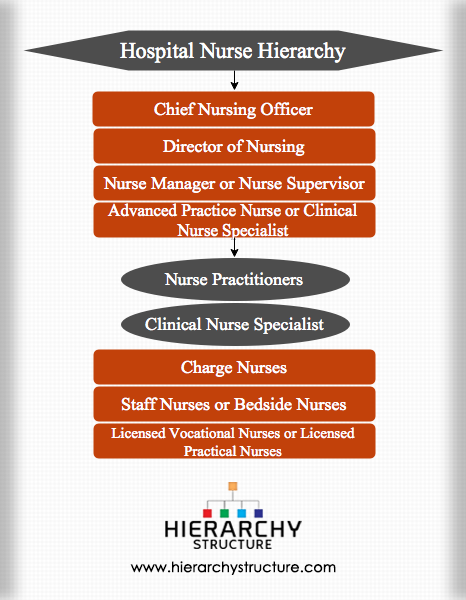Whenever we visit hospitals we see a lot of nurses who are working with different doctors and departments. Though all the nurses are important but there is a certain order and organizational structure that is followed to place nurses and to designate them with titles.
According to this structure, those with the maximum experience and the best qualifications are placed at the top followed by those with lesser experience and qualifications. If you wish to understand the hierarchical structure of nurses in hospitals, you can read the following given information.
Chief Nursing Officer
The chief nursing officer is placed at the top position of the pyramid and has mainly an administrative and supervisory role to play in a hospital. This is a position of decision making where the individual has to make major decisions regarding welfare of nursing staff career.
Director of Nursing
The position of director of nursing comes after the CNO and the person working at this position is mainly responsible for recruiting and placing nurses at various positions. This position is also of paramount importance.
Nurse Manager or Nurse Supervisor
Nurse Managers and nurse supervisors come at the next position and form a part of the leadership team. They are also referred to as nursing executives and are available 24 hours a day to direct and supervise the other nursing staff. They are not only responsible for Hospital management but also tending to the needs of patients and their family members
Advanced Practice Nurse or Clinical Nurse Specialist
Advanced practice nurses who are sometimes also referred to as clinical nurse specialists are those nurses who have already completed their advanced training beyond the basic Nursing education or criteria which all the registered nurses must fulfill. They are the ones who meet higher clinical and educational requirements than other nurses. Within this category, there are two subcategories which are given as follows:
- Nurse practitioners-these are those nurses who work closely with physicians and are qualified to diagnose and treat common illnesses. They can also work as the patient’s main healthcare provider.
- Clinical nurse specialist-they are experts of a specific area of nursing practice for example, they may specialize in surgery, pediatric, diabetic, geriatric, cardiovascular or psychiatric patients.
Charge Nurses
During each assigned shift, charge nurses are mainly responsible for directing and scheduling nursing care in a specific unit or ward. They are the first people in contact if there is any kind of a problem with the bedside nurse.
Staff Nurses or Bedside Nurses
These are registered nurses or RNs who make for the largest segment of healthcare workers. They have a bachelor’s degree, an associate degree or a diploma and are the ones who are in direct contact of the patients. They continuously monitor, observe and assess the patient’s progress and note down recordings.
Licensed Vocational Nurses or Licensed Practical Nurses
These are those nurses who perform basic patient duties like taking vital signs, monitoring medications and injections etc. They do not take patient related decisions.

